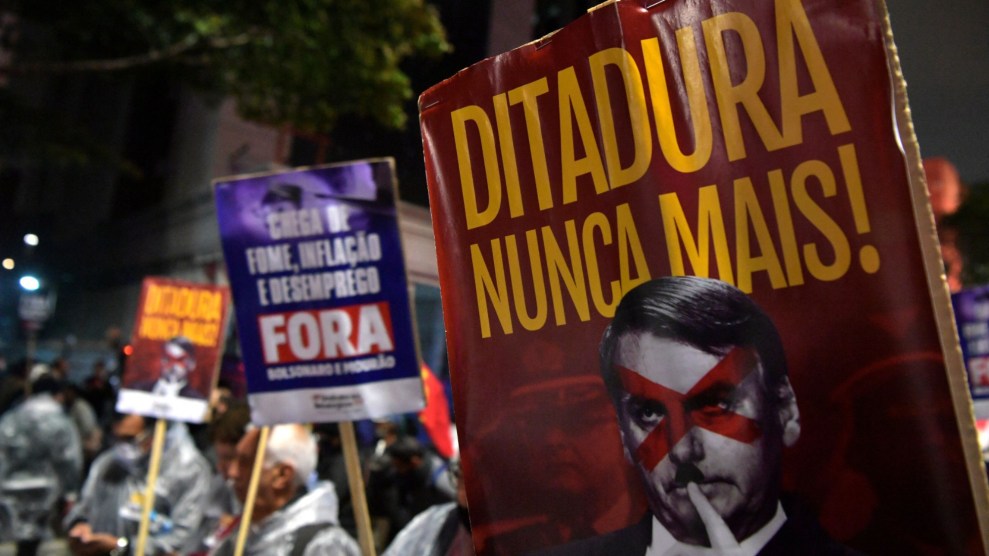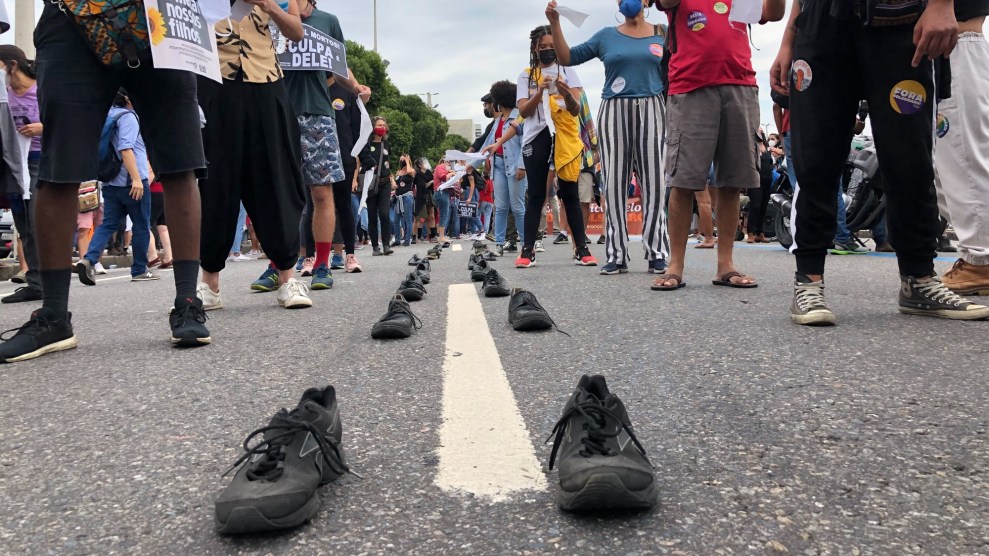
Vendor's towels for sale featuring Brazilian presidential candidates.Eraldo Peres/AP
Every other day, my WhatsApp bursts with messages from friends in Brazil and abroad expressing equal parts of excitement and apprehension as Sunday’s Brazilian presidential elections approach. On Wednesday, my best friend who lives in the country’s capital, Brasília, texted to say she was scared of wearing red clothes to go vote this weekend because red is the color associated with the Worker’s Party of former President Luiz Inácio Lula da Silva. Lula, the current front-runner, has a real, if slim, chance to beat far-right incumbent President Jair Bolsonaro in the first round by getting more than 50 percent of valid votes. “The mood is terrible,” she wrote, later adding that in the last 48 hours, four instances of political violence had been recorded across the country. “It’s very sinister this fear of expressing yourself.”
My friend’s worries are justified. The upcoming presidential elections in my home country are the most fraught and hate-filled in recent memory. In July, one of the president’s followers fatally shot a local Worker’s Party treasurer at his Lula-themed birthday party. Even before the official kick-off of the campaign in August, pro-Lula protesters were bombarded with feces and urine. On September 7, the day Brazil commemorated 200 years of independence, in the midst of a political discussion, a Bolsonaro supporter killed a Lula supporter, stabbing him 70 times and attacking him with an axe. This month, a researcher with Datafolha, one of the main polling institutes in Brazil, was assaulted. In a Rio de Janeiro bar, a 19-year-old woman was struck in the head after a Bolsonaro fan threatened to hit her sister when she criticized the president. Almost 70 percent of Brazilians surveyed in a September poll said they fear being victims of politically motivated violence.
“Online and offline hate speech and harassment and serious political violence have made many Brazilians afraid to express political opinions and exercise their political rights,” Juanita Goebertus, Americas director at Human Rights Watch, said in a statement. “Electoral and judicial authorities, police forces, and other authorities should do their utmost to protect freedom of speech and assembly, and ensure that Brazilians can vote safely.” Experts with the United Nations have also called for peaceful elections and condemned “continuing attacks against democratic institutions, the judiciary and the electoral system in Brazil.”
This is not the first time political violence has been part of a Brazilian election. In 2018, Marielle Franco, a Black, gay, feminist Rio de Janeiro councilmember and human rights advocate was killed along with her driver after leaving a Black women’s empowerment event. She has become an international icon as a symbol of resistance and activism, but her murder remains unsolved. That same year, while on the campaign trail, Bolsonaro was stabbed by a mentally ill man. Since then, the country’s Superior Electoral Court, which oversees elections, has recorded a spike in violence against candidates. When my American coworkers recently asked me what I thought the outcome of this election would be, I matter-of-factly stated I believed Lula would win, if only he didn’t get murdered first. (The leading candidate’s security apparatus has been reinforced, and he’s been wearing a bulletproof vest at public events.)
Bolsonaro himself has often incited hostility if not outright violence. A former army captain and a member of congress for 27 years, he was famous for his misogynistic and homophobic views. As president, he is notable for his disastrous handling of the Covid-19 pandemic and disregard for the Amazon and climate change. He has called for the Worker’s Party to be swept into the “trash bin of history” and talked about shooting the “petralhada,” a pejorative way of referring to those who vote for the left-leaning party. This authoritarian president, who received a full endorsement from former President Donald Trump, has loosened firearms laws, which has resulted in a three-digit surge in gun ownership registration and told his supporters to “prepare” for what is likely to be a negative outcome for the president. Before Independence Day rallies in September, Bolsonaro urged his supporters to “go to the streets one last time.”
In anticipation of his defeat in the polls, which show Lula leading by 14 points, Bolsonaro has borrowed from Trump’s playbook to repeatedly cast doubt on the integrity and security of the elections. He has attacked Brazil’s Superior Electoral Court and Supreme Court justices and spread baseless claims of voter fraud while insisting that the highly secure electronic voting machines be replaced with paper ballots. A few days before Brazilians head to the polls, Bolsonaro’s party even released a document outlining a plan to dispute the election results, including non-substantiated allegations that government employees and contractors have the “absolute power” to manipulate the voting system. In response, the Superior Electoral Court issued a statement calling the claims false lies “without any basis in reality.”
The president’s antidemocratic tendencies, flirtation with Brazil’s military dictatorship past, and the support he has from the armed forces and the military police have raised concerns domestically and abroad about a potential coup in case of a defeat—or, at the very least, a post-election scenario similar to what took place in the United States following the 2020 presidential election and culminating in the January 6 insurrection. On Wednesday, the US Senate unanimously passed a resolution urging the United States government to “immediately recognize the outcome of the election in Brazil, if that election is determined by international observers and organizations to have been free and fair.” In a video message shared by Lula’s campaign, Sen. Bernie Sanders (I-Vermont), who introduced the resolution, said, “The world is watching this election and it’s imperative that the voices of the Brazilian people be heard and whatever the results respected by people of all political ideologies.”
In August, I spoke with Guilherme Casarões, a political scientist and professor at Getulio Vargas Foundation in São Paulo about Bolsonaro’s radicalization and the possibility of “social chaos” ahead and after the elections:
Bolsonaro has been stating very clearly that he has no interest in accepting the outcome of the election if it’s not his own victory. There is a Trump-like element to his unwillingness to accept an unfavorable outcome on top of a fraud narrative. In the case of the United States, I think it didn’t get worse because there is still some institutional resistance. The military did not embark on Trump’s coup adventure, some Republican congressmen also did not accept it or wanted to distance themselves. Now January 6 is being investigated. You have a series of measures that show a certain democratic resistance that I don’t know we would have in Brazil, especially if civil society is unable to take a stand. Not because there are no democrats in Brazil, but because political institutions have already been dismantled or co-opted.
In his desperation and urge to hold onto power that may echo Trump, Bolsonaro, who has said his only three options are prison, death, or victory, maintains that he’ll accept the result of the elections, but always with the caveat that the elections must be “clean.” Other times, again using similar tactics to the former US president, he rallies his base by saying it’s impossible for him not to win in the first round and that if he doesn’t get 60 percent of the votes, something “abnormal” will have taken place. Bolsonaro’s die-hard supporters are buying into that extremist, denialist rhetoric and then escalating it. On top of widespread disinformation around election fraud, researchers with ActiveFence, a tech company using artificial intelligence to monitor online harm, have detected online discourse promoting military intervention—including calls to misappropriate article 142 of the Brazilian Constitution, which states the armed forces are, under presidential authority, to guarantee “law and order”—and suggesting the military should play a more active role in the electoral process.
The stakes of the Brazilian presidential elections can’t be overstated. In some ways similar to the choices facing US voters ahead of the November midterm elections in the United States, Brazilians will be weighing whether or not to uphold democratic institutions and values, truth, and freedom of expression. As I write this article, a press release email arrived in my inbox promoting an op-ed with the headline: “Can democracy survive Brazil’s upcoming elections?” I find myself asking the same question.












